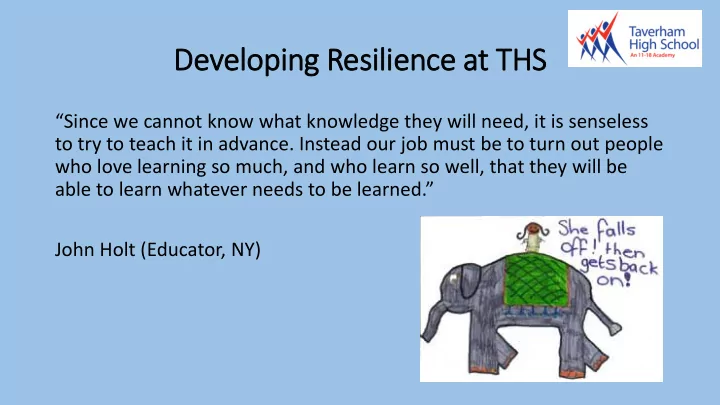

Developing Resilience at THS “Since we cannot know what knowledge they will need, it is senseless to try to teach it in advance. Instead our job must be to turn out people who love learning so much, and who learn so well, that they will be able to learn whatever needs to be learned.” John Holt (Educator, NY)
What is Resilience? Resilience is our ability to adapt and bounce back when things don't go as planned. Resilient people don't wallow or dwell on failures; they acknowledge the situation, learn from their mistakes, and then move forward.
Why Resilience? In 2009 Edexcel published a global survey which canvassed the views from employers in a variety of sectors from 25 countries. Resoundingly all employers said the same thing: “ We want workers who have the right attitude, a willingness to learn and an understanding of how to conduct themselves in the work place” The most desirable skills/traits so commonly lacking in school leavers were said to be the following: • Problem solving • Responsibility • Communication • Creativity • Teamwork • Initiative • Empathy
What do we hope this is wil ill achieve? Pupils who… • Can cope with deadlines • Can manage their own time • Are resourceful • Know when to ask for help • Take responsibility for their own learning • Manage their own distractions • Become absorbed in their learning • Can adapt to different environments • Have the emotional resilience to tackle challenges, make mistakes and learn from them
Strategies teachers are using in the classroom… • Encouraged to exhaust other options before asking for help • Guide pupils to where they can find the answer rather than answering for them • Questioning • Adapting language to encourage perseverance • Praising the process of learning rather than just the end result • Encouraging pupils to understand that making mistakes is part of learning • Giving pupils the time to produce drafts and improve their work • Support pupils with their emotional resilience by giving them time to discuss a question with a partner before asking for answers
What ki kind of f attit itude do we want our r pupil ils s to have?
What are we already doing at THS? • Resilience working group made up of teachers from different faculties. We meet every few weeks to discuss how we can further encourage pupils to become ore resilient learners • Fortnightly tutor time activities where students can focus on how they learn rather than what they learn • Meetings with feeder junior schools to ascertain what input Year 7 students have already had on resilience • Regular newsletters and the resilience tab on the website focused on resilience, including tips for parents as to how you can encourage your children at home (new newsletter out soon • Assemblies ‘ Learning to Learn Day’ on 21 st February • • ‘Resilience’ category for positive behaviour entries on Progresso • Whole staff CPD sessions
How can you help at home? • Demonstrate/model sticking at things, even if they are difficult • Talk about how you feel when you’re taking on challenges • Praise your child when they persevere • Help them find activities that are engaging and absorbing • Talk to them about what helps them to concentrate and manage distractions • Encourage questions • Help them to find ways of using reference materials such as text books and the Internet • Ask not what they did at school, but what they learned • Encourage flexibility and the ability to change a plan if necessary • Demonstrate/model being a good learner • Admit when you have made a mistake and talk to them about how you will rectify it
Recommend
More recommend